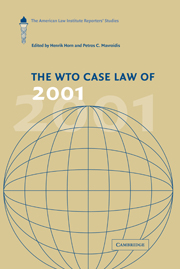Book contents
- Frontmatter
- Contents
- Foreword
- A note on the American Law Institute
- List of reporters
- 1 Introduction
- 2 EC – Asbestos European Communities – Measures Affecting Asbestos and Asbestos-Containing Products
- 3 US – Shrimp United States – Import Prohibition of Certain Shrimp and Shrimp Products, Recourse to Article 21.5 of the DSU by Malaysia
- 4 US – Lamb United States – Safeguard Measures on Imports of Fresh, Chilled or Frozen Lamb Meat from New Zealand and Australia: What Should Be Required of a Safeguard Investigation?
- 5 EC – Bed Linen European Communities – Anti-Dumping Duties on Imports of Cotton-Type Bed Linen from India
- 6 Mexico – Corn Syrup Mexico – Anti-Dumping Investigation of High Fructose Corn Syrup from the United States, Recourse to Article 21.5 of the DSU by the United States
- 7 Argentina – Ceramic Tiles Argentina – Definitive Anti-Dumping Measures on Imports of Ceramic Floor Tiles from Italy
- 8 US – Lead and Bismuth II United States – Imposition of Countervailing Duties on Certain Hot-Rolled Lead and Bismuth Carbon Steel Products Originating in the United Kingdom: Here Today, Gone Tomorrow? Privatization and the Injury Caused by Non-Recurring Subsidies
- 9 US – Export Restraints United States – Measures Treating Export Restraints as Subsidies
- 10 Canada - Dairy Canada – Measures Affecting the Importation of Dairy Products and the Exportation of Milk
- 11 US – Section 110(5) Copyright Act USt – Section 110(5) of the US Copyright Act, Recourse to Arbitration under Article 25 of the DSU: Would've or Should've? Impaired Benefits due to Copyright Infringement
- Index
- References
6 - Mexico – Corn Syrup Mexico – Anti-Dumping Investigation of High Fructose Corn Syrup from the United States, Recourse to Article 21.5 of the DSU by the United States
Published online by Cambridge University Press: 06 July 2010
- Frontmatter
- Contents
- Foreword
- A note on the American Law Institute
- List of reporters
- 1 Introduction
- 2 EC – Asbestos European Communities – Measures Affecting Asbestos and Asbestos-Containing Products
- 3 US – Shrimp United States – Import Prohibition of Certain Shrimp and Shrimp Products, Recourse to Article 21.5 of the DSU by Malaysia
- 4 US – Lamb United States – Safeguard Measures on Imports of Fresh, Chilled or Frozen Lamb Meat from New Zealand and Australia: What Should Be Required of a Safeguard Investigation?
- 5 EC – Bed Linen European Communities – Anti-Dumping Duties on Imports of Cotton-Type Bed Linen from India
- 6 Mexico – Corn Syrup Mexico – Anti-Dumping Investigation of High Fructose Corn Syrup from the United States, Recourse to Article 21.5 of the DSU by the United States
- 7 Argentina – Ceramic Tiles Argentina – Definitive Anti-Dumping Measures on Imports of Ceramic Floor Tiles from Italy
- 8 US – Lead and Bismuth II United States – Imposition of Countervailing Duties on Certain Hot-Rolled Lead and Bismuth Carbon Steel Products Originating in the United Kingdom: Here Today, Gone Tomorrow? Privatization and the Injury Caused by Non-Recurring Subsidies
- 9 US – Export Restraints United States – Measures Treating Export Restraints as Subsidies
- 10 Canada - Dairy Canada – Measures Affecting the Importation of Dairy Products and the Exportation of Milk
- 11 US – Section 110(5) Copyright Act USt – Section 110(5) of the US Copyright Act, Recourse to Arbitration under Article 25 of the DSU: Would've or Should've? Impaired Benefits due to Copyright Infringement
- Index
- References
Summary
Introduction and summary of main legal issues
The 21.5 AB ruling in Mexico – Corn Syrup arises out of a dispute between the United States and Mexico concerning whether the Mexican agency's finding of material injury from dumping was consistent with the Anti-dumping Agreement. The original Panel found that the agency's determination of the existence of a threat of material injury to the domestic industry was made in violation of numerous provisions of the Anti-dumping Agreement. In light of these findings by the panel, the agency made a redetermination and the United States filed a 21.5 complaint, claiming that the redetermination failed to address adequately the defects identified by the original panel.
The 21.5 Panel agreed with the United States that an objective and unbiased agency could not infer the projected increase in imports asserted by the Mexican agency from the evidence on the record, and reached the same conclusion concerning the projections of the effects of these increases on the domestic industry. Here the issue was whether Mexico had analyzed various factors affecting demand for imports and the state of the domestic industry pursuant to Articles 3.4 and 3.7 of the Anti-dumping Agreement and whether the analysis, to the extent that it was done, would allow an objective and unbiased agency to come to the conclusion concerning threat of injury that the Mexican agency did come to.
- Type
- Chapter
- Information
- The WTO Case Law of 2001The American Law Institute Reporters' Studies, pp. 140 - 154Publisher: Cambridge University PressPrint publication year: 2004

